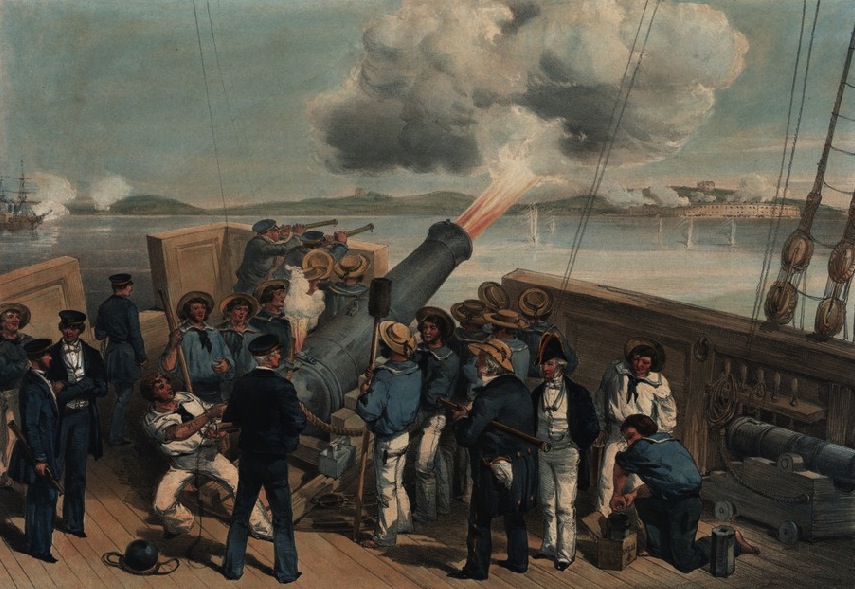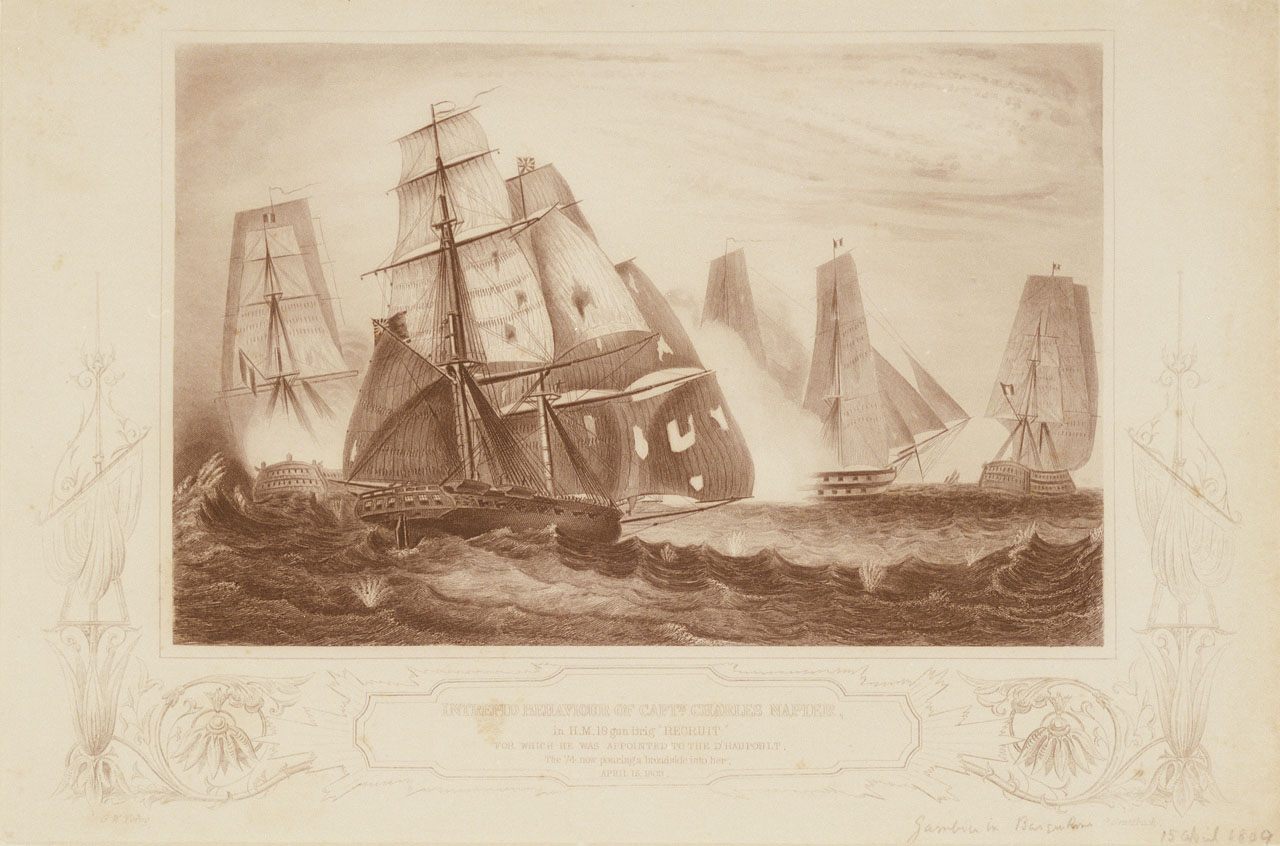|
û
land War
The û land War ( fi, Oolannin sota, sv, û lûÊndska kriget) is the Finnish term for the operations of a British-French naval force against military and civilian facilities on the coast of the Grand Duchy of Finland in 1854ã1856, during the Crimean War between the Russian Empire and the allied Second French Empire, France and United Kingdom, Britain. The war is named after the Battle of Bomarsund in û land. Although the name of the war refers to û land, skirmishes were also fought in other coastal towns of Finland in the Gulf of Bothnia and the Gulf of Finland. The Russian Empire, advancing on the Romanian front, had provoked the Ottoman Empire to declare war on 4 October, 1853, and Britain and France decided to support the Ottomans. The purpose of the û land War was to sever Russia's service routes and foreign trade and force it to sue for peace, and to involve Sweden in the war against Russia. The blockade was to be carried out in such a way as to render the Russian navy in the ... [...More Info...] [...Related Items...] OR: [Wikipedia] [Google] [Baidu] |
Bombardment Of Bomarsund
The Battle of Bomarsund, in August 1854, took place during the û land War, which was part of the Crimean War, when an United Kingdom of Great Britain and Ireland, Anglo-Second French Empire, French expeditionary force attacked a Russian Empire, Russian fortress. It was the only major action of the war to take place at Bomarsund, û land, Bomarsund in the Baltic Sea. Background Bomarsund was a 19th-century fortress, the construction of which had started in 1832 by Russian Empire, Russia in Sund, û land, Sund, û land, in the Baltic Sea. Bomarsund had not been completed (only two towers of the planned twelve subsidiary towers had been completed). When the war broke out the fortress remained vulnerable especially against forces attacking over land. Designers of the fortress had also assumed that narrow sea passages near the fortress would not be passable for large naval ships; while this assumption had held true during the time of sailing ships, it was possible for steam powered s ... [...More Info...] [...Related Items...] OR: [Wikipedia] [Google] [Baidu] |
Suomenlinna
Suomenlinna (; until 1918 Viapori, ), or Sveaborg (), is an inhabited sea fortress the Suomenlinna district is on eight islands of which six have been fortified; it is about 4 km southeast of the city center of Helsinki, the capital of Finland. Suomenlinna is popular with tourists and locals who enjoy it as a picturesque picnic site. Originally named ''Sveaborg'' (Castle of the Swedes), or ''Viapori'' as referred to by Finnish-speaking Finns, it was renamed in Finnish to ''Suomenlinna'' (Castle of Finland) in 1918 for patriotic and nationalistic reasons, though it is still known by its original name in Sweden and by Swedish-speaking Finns. The Swedish crown commenced the construction of the fortress in 1748 as protection against Russian expansionism. The general responsibility for the fortification work was given to Augustin EhrensvûÊrd. The original plan of the bastion fortress was strongly influenced by the ideas of Vauban, the foremost military engineer of the time, and t ... [...More Info...] [...Related Items...] OR: [Wikipedia] [Google] [Baidu] |
Platon Rokassowski
Platon may refer to: People * Plato (ö ö£ö˜üüö§, romanized as ''PlûÀtén''), Greek philosopher * Plato (comic poet) (fl. 420ã391 BCE) * Plato of Bactria (2nd century BCE), Greco-Bactrian king * Plato (exarch) (fl. 645ã653), Byzantine exarch of Ravenna * Platon, obscure ancient Greek writer of uncertain date, whose attributed works share a name with those of Aristagoras (poet) * Plato of Sakkoudion (735ã814), Byzantine saint * Platon Levshin (1737ã1812), Metropolitan of Moscow * Nikolaos Platon (1909ã1992), Greek archaeologist * Platon (Kulbusch) (1869ã1919), Estonian Orthodox Church bishop of Tallinn and all Estonia * Platon Chirnoagá (1894ã1974), Romanian Brigadier-General during World War II * Platon (photographer) (born 1968), Greek-English photographer Places * Platoé Platoé is a village in the administrative district of Gmina Czarnoé¥yéy, within Wielué County, éû°dé¤ Voivodeship, in central Poland. It lies approximately west of Czarnoé¥yéy, north ... [...More Info...] [...Related Items...] OR: [Wikipedia] [Google] [Baidu] |
Governor-General
Governor-general (plural ''governors-general''), or governor general (plural ''governors general''), is the title of an office-holder. In the context of governors-general and former British colonies, governors-general are appointed as viceroy to represent the monarch of a personal union in any sovereign state over which the monarch does not normally reign in person. Governors-general have also previously been appointed in respect of major colonial states or other territories held by either a monarchy or republic, such as Japan in Korea and List of Governors-General of French Indochina, France in French Indochina, Indochina. Current uses In modern usage, in the context of governor-generals and former British colonies, the term ''governor-general'' originated in those British colonies that became self-governing within the British Empire. Before World War I, the title was used only in federated colonies in which its constituents had had ''governors'' prior to federating, namely C ... [...More Info...] [...Related Items...] OR: [Wikipedia] [Google] [Baidu] |
Victoria Cross
The Victoria Cross (VC) is the highest and most prestigious award of the British honours system. It is awarded for valour "in the presence of the enemy" to members of the British Armed Forces and may be awarded posthumously. It was previously awarded by countries of the Commonwealth of Nations, most of which have established their own honours systems and no longer recommend British honours. It may be awarded to a person of any military rank in any service and to civilians under military command. No civilian has received the award since 1879. Since the first awards were presented by Queen Victoria in 1857, two-thirds of all awards have been personally presented by the British monarch. The investitures are usually held at Buckingham Palace. The VC was introduced on 29 January 1856 by Queen Victoria to honour acts of valour during the Crimean War. Since then, the medal has been awarded 1,358 times to 1,355 individual recipients. Only 15 medals, of which 11 to members of the Britis ... [...More Info...] [...Related Items...] OR: [Wikipedia] [Google] [Baidu] |
Steam-powered Vessel
Steam-powered vessels include steamboats and steamships. Smaller steamboats were developed first. They were replaced by larger steamships which were often ocean-going. Steamships required a change in propulsion technology from sail to paddlewheel to screw to steam turbines. The latter innovation changed the design of vessels to one that could move faster through the water. Engine propulsion changed to steam turbine in the early 20th century. In the latter part of the 20th century, these, in turn, were replaced by gas turbines. ''Steamship'' generally refers to a larger steam-powered ship, usually ocean-going, capable of carrying a (ship's) boat. The engine room, to the right, is a concept drawing during the construction of the ship. The term steam wheeler is archaic and rarely used. In England, "steam packet", after its sailing predecessor, was the usual term; even "steam barge" could be used (Steam tonnage in Lloyd's Register exceeded sailing ships tonnage by 1865). The French t ... [...More Info...] [...Related Items...] OR: [Wikipedia] [Google] [Baidu] |
Alexandre Parseval-Deschenes
Alexandre Ferdinand Parseval-Deschenes (27 November 1790 ã 10 June 1860) was a French admiral and senator. Life Born in Paris to an aristocratic family, Alexandre was the nephew of the mathematician Marc-Antoine Parseval and the Acadûˋmicien FranûÏois-Auguste Parseval-Grandmaison. He volunteered for the Navy in 1804 and participated in the recapture of Fort Le Diamant on Martinique, then fought at Trafalgar as an aspirant on board ''Bucentaure'', the admiral's flagship. As an enseigne de vaisseau, Parseval-Deschenes participated in the 1815 hydrographic investigations of Brittany. In 1817 he took part in the expedition that retook Guyana for France, ending its occupation by Portugal, and then commanded the French naval station in that colony for two years. In 1822, as lieutenant de vaisseau, Alexandre was awarded the Lûˋgion d'honneur for successfully rescuing the crew of the frigate ''Africaine'', shipwrecked on the Newfoundland coast. He then commanded the frigate ''Iphi ... [...More Info...] [...Related Items...] OR: [Wikipedia] [Google] [Baidu] |
French Navy
The French Navy (french: Marine nationale, lit=National Navy), informally , is the maritime arm of the French Armed Forces and one of the five military service branches of France. It is among the largest and most powerful naval forces in the world, ranking seventh in combined fleet tonnage and fifth in number of naval vessels. The French Navy is one of eight naval forces currently operating fixed-wing aircraft carriers,Along with the U.S., U.K., China, Russia, Italy, India and Spain with its flagship being the only nuclear-powered aircraft carrier outside the United States Navy, and one of two non-American vessels to use catapults to launch aircraft. Founded in the 17th century, the French Navy is one of the oldest navies still in continual service, with precursors dating back to the Middle Ages. It has taken part in key events in French history, including the Napoleonic Wars and both world wars, and played a critical role in establishing and securing the French colonial ... [...More Info...] [...Related Items...] OR: [Wikipedia] [Google] [Baidu] |
General
A general officer is an Officer (armed forces), officer of highest military ranks, high rank in the army, armies, and in some nations' air forces, space forces, and marines or naval infantry. In some usages the term "general officer" refers to a rank above colonel."general, adj. and n.". OED Online. March 2021. Oxford University Press. https://www.oed.com/view/Entry/77489?rskey=dCKrg4&result=1 (accessed May 11, 2021) The term ''general'' is used in two ways: as the generic title for all grades of general officer and as a specific rank. It originates in the Tudor period, 16th century, as a shortening of ''captain general'', which rank was taken from Middle French ''capitaine gûˋnûˋral''. The adjective ''general'' had been affixed to officer designations since the late Middle Ages, late medieval period to indicate relative superiority or an extended jurisdiction. Today, the title of ''general'' is known in some countries as a four-star rank. However, different countries use di ... [...More Info...] [...Related Items...] OR: [Wikipedia] [Google] [Baidu] |
Charles Napier (Royal Navy Officer)
Admiral Sir Charles John Napier KCB GOTE RN (6 March 1786Priscilla Napier (1995), who is not elsewhere free from error, gives the birth year as 1787 (p. 1, and book title), but provides no evidence. All other authorities agree on 1786. ã 6 November 1860) was a British naval officer whose sixty years in the Royal Navy included service in the War of 1812, the Napoleonic Wars, Syrian War and the Crimean War (with the Russians), and a period commanding the Portuguese navy in the Liberal Wars. An innovator concerned with the development of iron ships, and an advocate of humane reform in the Royal Navy, he was also active in politics as a Liberal Member of Parliament and was probably the naval officer most widely known to the public in the early Victorian Era. French Revolutionary and Napoleonic Wars He became a midshipman in 1799 aboard the 16-gun sloop , but left her in May 1800 before she was lost with all hands. He next served aboard , flagship of Sir John Borlase Warren.Pri ... [...More Info...] [...Related Items...] OR: [Wikipedia] [Google] [Baidu] |




